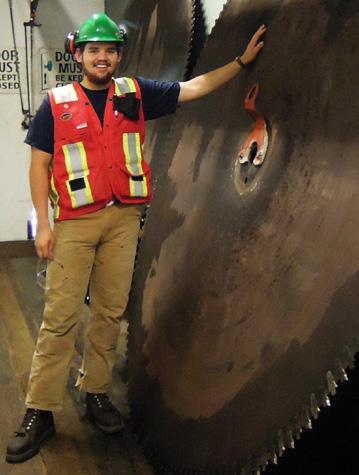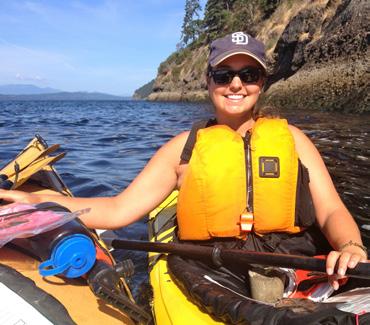Employer Partner Guide


Contents A partnership that works! ............................................................ 2 UBC Faculty of Forestry Co-op Program ................................ 2 Welcome ........................................................................................... 2 Vision .................................................................................................. 2 Objectives ......................................................................................... 2 History ................................................................................................ 3 Co-op Employer Partners ........................................................... 3 Co-op is… ......................................................................................... 3 Students............................................................................................. 4 Roles and Responsibilities ........................................................... 5 The Work Term ................................................................................ 7 Contacts ............................................................................................ 9
A partnership that works!
UBC Faculty of Forestry Co-op Program
Welcome
Thank you for hiring a UBC Faculty of Forestry co-op student. This guide is designed to prepare employers for the co-op work term.
Vision
The UBC Faculty of Forestry Co-op Program provides an academic option grounded in our commitment to “an exceptional learning environment that fosters global citizenship, advances a civil and sustainable society, and supports outstanding research to serve the people of British Columbia, Canada and the world”. Co-op promotes experiential learning in addition to career and personal development through student participation in paid and degree related employment. Learning outcomes include development of communication skills and integration of classroom theory with workplace practice.
Objectives
The UBC Faculty of Forestry Co-op Program is comprised of a dedicated group of students, as well as faculty, staff and administrators who are committed to:

• The personal and professional development of students
• Creating partnerships with employers, communities, faculty and professional organizations
• Bridging academic learning with practical experience
2 Forestry Co-op Employer Partner Guide
Give UBC Forestry co-op students a career related work experience and benefit from their enthusiasm, motivation, and professionalism.
History
Founded in 1996, the Faculty of Forestry Co-op Program serves students, employers and faculty members through the deployment of a structured experiential learning program. Co-operative education programs were first introduced to Canada in 1957 at the University of Waterloo. Currently we have co-op options in each of the five bachelor degrees offered in the Faculty of Forestry.
Co-op Employer Partners
Participating employers have access to an excellent staffing resource for peak periods or special projects, as well as the opportunity to recruit, train and assess potential future employees.
As a co-op partner, you guide students in developing effective work habits through on-the-job training. You also provide advice on career choices and mentorship for professional development. Co-op work terms give students an opportunity to move beyond routine operations to more challenging and complicated assignments.
Co-op is…
Partnership
• The Co-op Program is a three-way partnership between employers, students and UBC
Work experience
• Each student contributes an average of 600 hours per four month work term to employers
Professional development
• Students are embedded in workplaces around the world and are supervised by professionals in their field of study
Learning program
• Students benefit from workshops designed to prepare them for the workplace by developing their resume, cover letter, networking and communication skills
A 12 to 20 month adventure

• The Co-op Program consists of 3 to 5 work terms during which students will work with industry professionals, complete assignments and, in some cases, travel the world
Paid
• Co-op students are paid a competitive wage which averaged $3,600 per month during the 2021 work terms.
3 Forestry Co-op Employer Partner Guide
Students
Profile
The Co-op Program is an elective option for students in any of the five undergraduate degree programs at the Faculty of Forestry:

• Forestry
• Forest Sciences
• Natural Resources Conservation
• Urban Forestry
• Wood Products Processing
All co-op students will have completed at least the first two years of their degree program and a series of co-op workshops before going on their first work term. While most students do not have much work experience at the outset, they are all eager to learn and experience new work environments. By the time they graduate, co-op students will have developed a resume that is comparable to someone who has been working for two years post graduation.
Availability
Co-op students are available to work 4, 8 or 12 month terms (sometimes longer with approval from the Co-op Coordinator) beginning in January, May, and September of each year.
Selection
Students undergo a rigorous selection and training process 8 months prior to their first work term. Students must demonstrate that they can conduct themselves professionally, are committed to working five work terms and possess the communication skills required to perform in the workplace. In addition, students must attend a safety workshop facilitated by WorkSafeBC.
Behavioural standards
Given the nature of the program and the demands of professional life in the workplace, all students are required to meet strict behavioural standards established by both the Co-op Program and the employers. For a more detailed account of these standards, consult the Co-op Terms and Conditions. Failure to comply with these behavioral standards may result in penalties ranging from a warning to a failing grade on their work term and expulsion from the Co-op Program, depending on the severity of the infraction.
4 Forestry Co-op Employer
Guide
Partner
Roles and Responsibilities
Employer Responsibilities
Employers provide challenging, career-related work experience. Students will be paid, supervised, and evaluated as regular employees by the employer.

As a co-op employer you will:
• Provide an orientation, including an overview of your organization, physical layout, relevant personnel, safety practices, and the duties and tasks expected of the student during the work term
• Advise the student on confidentiality issues and ensure that they sign any required non-disclosure agreements prior to commencing work
• Provide the student with a supervisor who will oversee his/her work and discuss expectations for the work term and, on a regular basis, and give the students honest and detailed feedback about the quality of his/her work and performance
• Provide the student with a functional workspace, equipment and supplies necessary to complete their duties
• Provide guidance for the student’s Learning Objectives
• Engage the student with productive and challenging work
• Participate in site visits and any follow-up measures required by the Co-op Coordinator to assess the student’s progress, performance, and experience
• Provide guidance for the student’s work term assignment (students are required to submit an assignment to their Co-op Coordinator for each 4-month work term) and, if necessary, advise the student about issues of confidentiality
• Submit an Assignment Release form to the Co-op Coordinator to confirm that the student’s assignment does not contain confidential material
• Submit a Final Co-op Evaluation form of the student’s performance; employers are encouraged to discuss this evaluation with the student
• If the student’s assignment is confidential, the employer must submit a grade using the Assignment Evaluation form
Co-op Employer Partner Guide
5 Forestry
Student Responsibilities
Co-op students act as ambassadors for the Faculty of Forestry and the University of British Columbia, and are therefore expected to maintain the highest standards of excellence and professional conduct.

Students will:
• Ensure they are registered in the appropriate co-op work term course and pay the tuition fee on time
• Honour the acceptance of a co-op work term by reporting to work on the scheduled date and fulfil the terms of employment to the best of their abilities
• Respect the policies, procedures, confidentiality and proprietary information of their employers
• Conform to all the conditions and rules that apply to employees in the organization they are working at. These may include: pay, allowances and benefits, normal working hours, union membership, physical examination requirements, safety regulations, and suitable attire
• Keep the Co-op Coordinator informed of changes to their address, telephone, e-mail, and work term information
• Arrange a site visit for their supervisor with their Co-op Coordinator
• Consult their Co-op Coordinator immediately if any problems arise during the work term
• Accept feedback and suggestions for improvement from supervisors, faculty advisors, and/or their Co-op Coordinator in a positive manner
• Complete a work term assignment for each 4 month term and submit it to their Co-op Coordinator on the 15th day of the last month of that term
• Discuss the assignment’s topic and issues of confidentiality with their work supervisor prior to completing the assignment, and obtain written permission to include data and statistics from the workplace
• Complete and submit all items listed on the Work Term Checklist and meet with the Co-op Coordinator to discuss their co-op experience when they return to campus
Role of the Faculty Advisor
Faculty advisors provide a link between the university and the student during the work term.
The faculty advisor:
• Provides technical and professional guidance to students upon request
• Approves topics for the student’s work term assignments
• Evaluates the student’s work term report
• Acts as a liaison between UBC and industry; discusses UBC’s academic program and industry needs with employers
• Promotes the Co-op Program and identifies future work term placements
Role of the Co-op Coordinator
Co-op Coordinators are the liaison between employers, faculty advisors, and students, and are responsible for ensuring that the objectives of the program are being met.
The Co-op Coordinator:
• Accommodates employers’ reasonable requests for job postings, interview space and presentation facilities
• Selects and prepares students for the recruitment cycle and work assignment
• Facilitates the recruitment process
• Deals with any problems that arise, either from the student’s, the employer’s, or the faculty advisor’s perspective
• Conducts site visits to assist in the evaluation of the student and employer, and to identify future work placements for co-op students
• Acts as a resource to students, employers, and faculty advisors during the work terms
• Answers students’ questions about their work term assignments
• Works with employers, students and faculty advisors in monitoring and evaluating the students’ work terms
• Reviews the success of each work placement at its completion based on the Final Co-op Evaluation forms submitted by the employer and the student
• Develops new work term opportunities for the Co-op Program
• Assists employers in identifying and developing work terms appropriate for co-op students
• Ensures that all co-op work terms are related to the students’ career objectives
6 Forestry Co-op Employer Partner Guide
The Work Term
Duration
Work terms are normally 4 months in length, beginning on the first day of the academic term and ending on the last. The employer and student may wish to arrange other starting and ending dates. However, to qualify as a co-op work term, students must be employed full-time for a minimum of 420 hours within a 4-month period (January – April, May – August, or September – December).
Work terms can be extended to 8 or 12 months (or longer). If a student’s work term is extended, he/she should be given increased responsibilities. An updated offer letter should also be forwarded to the Co-op Coordinator.
Expectations
Co-op students expect to be treated like any other employee within your company and should have a challenging job experience. As an employer you are not only looking for a job well done, but for students to do their jobs with a high level of enthusiasm and initiative.
To ensure expectations between yourself and the student are clearly understood, we suggest that you orient the students to all aspects of your company during the first week of the work term.
Typically, students will appreciate the relevance of their specific duties if they understand and realize the overall objectives of the company. Also, the students should be introduced to various team members with whom they will be working. This will help the students appreciate the skills and accomplishments of others and see how their contributions fit into the larger company objectives. During the orientation and training, tasks assigned to the student should be clarified and an effort made to show them how to perform the tasks.
Observe the student’s performance and provide constructive feedback and support on their progress. This will ensure that students have an accurate picture of their work and what is expected of them. Co-op students appreciate having periodic reviews during their work term.
Employers should also keep in mind the student’s learning curve is usually 1 to 3 weeks. Students will need time to adapt to the company culture, policies, procedures, and basically finding their way around the work site.
Evaluation
Work terms are part of the co-op academic requirements and are graded as either “Pass” or “Fail”; the grade is recorded on the student’s transcript. Co-op students’ grades are based on:
• The supervisor’s Final Co-op Evaluation form
• The student’s work term assignment, and
• The site visit review
In order to receive a passing grade for the co-op work term students must obtain satisfactory evaluations in all of the above. Students must also successfully complete and submit of all items listed on the Work Term Checklist before a passing grade will be assigned.
Site Visits
Mid-way into the work term, students and supervisors are visited by a Co-op Coordinator. It is the student’s responsibility to arrange the site visit. The purpose of the visit is to:

• Evaluate the educational merit of the work placement, and to ensure that proper supervision and a safe work environment are provided
• Review student’s work performance
• Ensure the student has a suitable topic for his/her work term assignment
Depending on the location and travel expenses, students and employers may not necessarily be visited in person. If this is the case, the site visit will be conducted by telephone, via Skype or via email.

7 Forestry
Guide
Co-op Employer Partner
Co-op Assignments
As part of their academic requirements, students must complete a co-op assignment for each 4-month work term. Depending upon what stage of the Co-op Program they are in, the assignment will be a Poster, a Written Report, an Oral Presentation, and/or another assignment approved by their Co-op Coordinator. The goal of these assignments is for students to demonstrate the learning that has taken place during the work term and for students to develop their communication skills.
Students should discuss selection of the assignment topic with their employer to ensure that it does not contain confidential material. Students are required to review their assignment with their supervisor prior to submitting it to their Co-op Coordinator.
Although the work term assignment is based on their work term, students are required to complete it on their own time. Students should not be working on their report during company time.
Employer Checklist
We recognize that employers are busy. Our goal is to make the process of working with a co-op student as easy as possible. To this end, we have created a checklist:
Before the work term begins:
• A formal offer letter to the student outlining:
- Start and end dates
- Hours of work
- Salary and any applicable benefits
- Supervisor’s name
- Location of work and where to report on first day
- Summary of duties/responsibilities
Within first 2 weeks of the work term:
• Meet with the student to review their Learning Objectives
Halfway through the work term:
• Site visit with the Co-op Coordinator either in-person, by phone, via Skype or via email. Students are responsible for coordinating this meeting

At the end of the work term:
• Submit Final Co-op Evaluation form
• Submit Assignment Release form
• If the student’s assignment is confidential, submit a grade using the Assignment Evaluation form
Troubleshooting
Any issues of concern should be directed to the appropriate Co-op Coordinator who will help to facilitate a resolution and provide support.
8 Forestry Co-op Employer Partner Guide
Keep in touch!
Get monthly updates from our co-op students and co-op employers around the world by signing up for the Co-op TreeRings Newsletter

You can also see daily posts from students on co-op work terms by following the Forestry Co-op Instagram page @forestrycoop
To see where students are working during the current work term, consult the interactive co-op work term map
Contacts
Nazlyn Pirani – Co-op Coordinator

Faculty of Forestry, Dean’s Office Forest Sciences Centre
2615-2424 Main Mall
Vancouver, BC V6T 1Z4
Telephone: 604-827-5196
E-mail: nazlyn.pirani@ubc.ca
Alberto Renteria – Co-op Coordinator

Faculty of Forestry, Dean’s Office Forest Sciences Centre
2609A-2424 Main Mall
Vancouver, BC V6T 1Z4
Telephone: 604-822-4793
E-mail: alberto.renteria@ubc.ca
9 Forestry Co-op Employer Partner Guide













